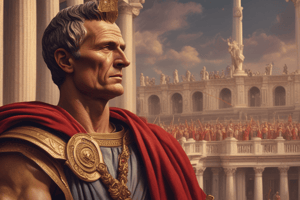Podcast
Questions and Answers
When was Julius Caesar born?
When was Julius Caesar born?
- 83 AD
- 83 BC (correct)
- 60 BC
- 75 BC
In which field did Julius Caesar start his public career?
In which field did Julius Caesar start his public career?
- Medicine
- Law (correct)
- Military
- Education
Who were Julius Caesar's two older siblings?
Who were Julius Caesar's two older siblings?
- Brutus and Portia
- Antonius and Cleopatra
- Maximus and Octavia
- Gaius and Julia (correct)
In which year did Julius Caesar serve as Consul alongside Pompey Magnus?
In which year did Julius Caesar serve as Consul alongside Pompey Magnus?
Which Roman general formed a close bond with Julius Caesar but later became his rival?
Which Roman general formed a close bond with Julius Caesar but later became his rival?
What position did Julius Caesar hold under Marius in 75 BC?
What position did Julius Caesar hold under Marius in 75 BC?
What event marked the beginning of the Civil War between Julius Caesar and other senators in 49 BC?
What event marked the beginning of the Civil War between Julius Caesar and other senators in 49 BC?
Why did Julius Caesar's actions upon returning to Rome lead to the Senate granting him extraordinary powers?
Why did Julius Caesar's actions upon returning to Rome lead to the Senate granting him extraordinary powers?
What was one of the significant changes Julius Caesar made as dictator in transforming the Roman state?
What was one of the significant changes Julius Caesar made as dictator in transforming the Roman state?
What event occurred on March 15th, 44 BC, that led to the assassination of Julius Caesar?
What event occurred on March 15th, 44 BC, that led to the assassination of Julius Caesar?
Which individual ultimately established the Roman Empire after Julius Caesar's assassination?
Which individual ultimately established the Roman Empire after Julius Caesar's assassination?
What is one reason why some historians believe Julius Caesar was assassinated?
What is one reason why some historians believe Julius Caesar was assassinated?
Flashcards are hidden until you start studying
Study Notes
Julius Caesar: A Historical Figure of Antiquity
Julius Caesar was one of the most influential figures of ancient Rome, serving as a military general and statesman during the latter part of the Roman Republic's decline into dictatorship. His name is synonymous with the transformation of the Roman government from a republican system to an imperial monarchy around the turn of the millennium BC. Here we will explore his life, accomplishments, and some key aspects surrounding him.
Early Life and Career
Julius Caesar was born on July 17th, 83 BC, and while little is known of his early childhood, he was educated by distinguished scholars such as Apollodorus Molo. He had two older siblings—a brother named Gaius Caesar and a sister named Julia, who were known to have been involved in politics earlier than Julius himself. Caesar began his public career as a lawyer in the Forum, gaining popularity through his eloquence and ability to persuade people. This led to his entrance into Roman politics where he served as a quaestor (treasurer) under Marius in 75 BC.
Caesar held several prestigious positions throughout his political career, including being elected as Consul twice: first in 60 BC alongside Marcus Licinius Crassus and later in 59 BC with Pompey Magnus, both of whom would become lifelong rivals. During this time, Caesar formed close bonds with Pompey, although their relationship deteriorated over power struggles between them. In 58 BC, he became governor of Cisalpine Gaul (northern Italy) for five years, which allowed him to amass wealth and experience leading armies.
Crossing the Rubicon and Rise to Dictator
In January of 49 BC, after returning from a Gallic campaign, Caesar crossed the Rubicon River with his army, breaking the law that prohibited him from entering Rome with armed men. This act became known as the 'Crossing of the Rubicon', marking the beginning of the Civil War between him and other senators. Eventually, Caesar emerged victorious despite losing his legions due to treacherous allies. He returned to Rome in triumph, his troops embracing him as the liberators of the city. As a result, the Senate voted unanimously to grant him extraordinary powers as a dictator, making him the undisputed ruler of Rome.
As dictator, Caesar initiated sweeping reforms aimed at transforming the Roman state into a more efficient bureaucracy. One significant change was the creation of new posts within the administration, allowing him to appoint loyal officials and supporters to important roles. Additionally, he implemented radical social reforms like land distribution among poor citizens. However, these measures proved controversial and were met with resistance from conservative elements within society.
Assassination and Legacy
Despite having defeated all major opponents, Caesar continued to face threats to his rule. On March 15th, 44 BC, sixty senators conspired together and assassinated him in the Roman Senate House (Curia). Many historians believe that Brutus, Cassius, and many others participated in the killing because they feared becoming subject to an absolute monarch. After his death, civil war erupted again, ultimately resulting in the establishment of the Roman Empire under Augustus Caesar, grandnephew of Julius Caesar.
Throughout history, various interpretations exist regarding the motives behind Caesar's murder. Some argue it was out of fear or jealousy towards his growing influence; others suggest conspiracies involving powerful families like the Plebeian Gracchi brothers, oppressed tribunes, and dissatisfied young aristocrats. Despite the controversy, Julius Caesar remains one of the most famous historical figures and played a pivotal role in shaping the course of Western civilization.
Studying That Suits You
Use AI to generate personalized quizzes and flashcards to suit your learning preferences.




